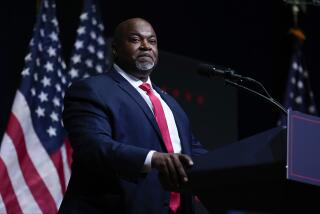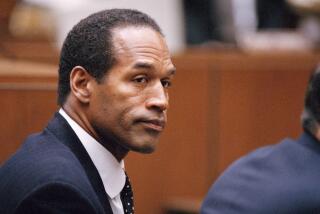One Picture, Two Perspectives : Marion Barry. Louis Farrakhan. Al Sharpton. Why do blacks and whites view the world so differently?
- Share via
It’s two weeks later, and people are still shaking their heads in disbelief: “How could they have voted for him?” they ask one another. “How could they, after what he did?”
The he in question is Marion Barry, the once and apparently future mayor of Washington. And in case you’ve forgotten what he did, the media have helpfully refreshed everyone’s memory with the video clip that cost the mayor his job and the taxpayers many thousands of dollars to keep Hizzoner jailed for six months. The clip, run frequently in the days preceding and following the primary election, yielded an astonishing sight: the then-mayor of Washington smoking crack cocaine with a woman not his wife in a local hotel and later being arrested by FBI agents in a successful “sting” operation.
Why the mostly black residents of the district voted for Barry--including a significant chunk of the black bourgeoisie, who were expected to vote for one of Barry’s two main challengers, both black--is part of a larger puzzle that journalists and others have been trying to piece together since Los Angeles blew up two years ago. Why do black and white people view the world so differently? Why, with the advent of integrated workplaces, haven’t the differences between similarly situated blacks and whites been reduced? Why does race so drastically affect our interpretations of what seems to be the same event?
Here’s another example. Last month, when President Clinton was vacationing on Martha’s Vineyard, a photograph appeared that neatly encapsulates the differences between world views of many blacks and whites. The photo showed Clinton and Washington powerbroker Vernon Jordan in a golf cart. Jordan was driving, grinning hugely for the cameras, while the President relaxed, feet on the dash.
Many white people saw that photo as an indication of how far we’ve come in race relations. Here is an important black man playing a game once reserved only for wealthy white men with the President of the United States, to whom he frequently gives counsel. To these people, the photo is a glass half-full; it’s an indication that racial progress has been made, a sign of hope for the future.
But many black people, including extremely mainstream ones, saw it differently. “Let me ask you this,” deadpanned a black investment banker at a blue-chip firm: “How come Vernon got to drive?” The banker was being facetious, of course, but the fact that he’d noticed--despite his own frequent appearances on many of the nation’s premier golf courses where he is, always, the Only One--said something. It said that some black people looked at the Vineyard photo and did not see the black adviser and long-time friend of the President being a genial host. (Jordan has, after all, summered on the Vineyard for years.) Instead, they saw Jordan playing Rochester to Clinton’s Jack Benny, Hoke to the President’s Mr. Daisy. They were seeing a glass half-empty. (The Washington Post reported that several upset black folks called Jordan’s office to chastise him for assuming the subservient role, which in turn upset Jordan, who is definitely a glass-half-full kind of guy. But the complaints must have hit home, because when the two played golf the next day, the President drove.)
One picture, two perspectives. But it is, in many ways, emblematic of why black Americans are often enigmas to their white peers. It explains why so-called reasonable black people with secure jobs in integrated workplaces refused to refute Louis Farrakhan in all his controversial entirety. It explains why many non-poor, politically savvy blacks insisted on voting for Al Sharpton for senator in the New York primary. (“I know he’s going to lose,” said one woman with a six-figure income. “But I’m angry, and I want them to get the message.”)
It explains, via polls that most white journalists find incredible, why many black people are unwilling to find O.J. Simpson guilty before he has appeared in front of a judge and jury. And it explains why, come November, Barry will be back in the saddle again.
More to Read
Get the L.A. Times Politics newsletter
Deeply reported insights into legislation, politics and policy from Sacramento, Washington and beyond. In your inbox twice per week.
You may occasionally receive promotional content from the Los Angeles Times.










